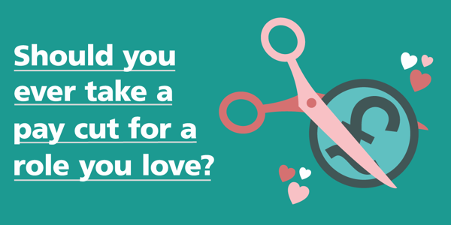Should you ever take a pay cut for a role you love?

This piece was written by freelancer Lucy Skoulding
When considering a new job opportunity, most of us don’t think only about the salary. Even if you consider yourself money-driven, you’ll still consider many other factors before accepting a job, from the holiday and other benefits you get, to the working hours, to the location and, of course, your responsibilities in the role.
Salary is not the be all and end all of a job, but it’s important that you only consider a pay cut if you have very good reasons to. It’s all too easy to be undervalued and underpaid. All of us want to progress in our careers, and one angle of looking at progression is pay increase. So never accept a pay cut ‘just because’.
If you’re offered an opportunity you love the sound of but it means a pay cut, it will be a difficult decision and the outcome will vary depending on the individual. There’s no right or wrong answer, so consider why you might go for it, whether it will work, and how you will handle it if you do it.
Reasons for considering a pay cut:
1. You’re taking your career in a new direction
If you’ve been in the same company for a while, you might feel like you’ve reached a dead end in your career and need to make a change in order to progress.
In my case, I wanted to stay in the same industry, but change my role quite significantly to get my career on track for what I want to do long-term, which is why I decided to accept a pay cut.
2. When you’re changing careers
You may also have to accept a pay cut if you change careers completely. You’ll likely be starting in a relatively junior role if you’ve never worked in an industry before, and if you’ve been in a senior role previously, there will be a pay difference.
3. You’re starting your own business
You might feel like it’s time to follow a dream and bring an idea you’ve had for a business to life. You may earn nothing to very little at first, but going it alone is all about the long-term results.
Waking up and knowing you’re making your own money, being your own boss, and choosing when and how you work is worth the initial pay cut for many people.
4. If you’re looking for better work-life balance
Perhaps you’ve been in a fast-paced, high-powered job for a number of years and want to slow things down. Our priorities change as we move through life and it’s totally normal to decide you’re done with the long hours and overtime and want to focus on your work-life balance.
If this is the case, you may want to alter the hours of your current role or look for a new position. If you’re reducing your hours or going part-time, accepting a pay cut is totally fine.
5. When everything evens out
Sometimes a job role is a lower pay than what you’re currently on but the benefits, like bonuses and holiday allowance, are much better. Or perhaps you’re taking a small pay cut but you no longer have to spend as much on travel, so it evens out.
If you’re taking on a new role you know you’ll love and you’re not really losing out, that’s the best case scenario.
Can you make it work?
If you’ve weighed up the options of taking a pay cut, you should next consider whether it actually fits with your lifestyle.
When I did it, I compared my current earnings with what they would be in the new role and worked out if I could actually afford to lose a bit of income and whether I could make certain changes in my life to help me manage the change.
If the pay cut is only small, consider whether you can save on travel or cut down on the direct debits like your phone bill that come out of your bank account each month. Or maybe you spend more money on lunch than you need to right now.
Be honest with your new boss about the fact you’re taking a pay cut. They will appreciate you’ve chosen to do this and may be able to help you manage it, for example by allowing you to work from home occasionally to save on travel. Be bold and ask them about your future earning potential in the role too – when could you be up for a promotion or pay rise?
Finally, ensure it’s actually something you want. How much do you value your current earnings? Are you prepared to make some lifestyle adjustments for the new job? Or will this de-motivate you and make you feel resentful?
How to handle the pay cut?
If you’ve weighed up all of the above and concluded that taking the pay cut is the right decision, it’s time to plan for it.
Firstly, you will need to work out a new budget. Depending on how much of a pay cut you’ve taken, there’s every possibility you can live similarly to before, just with a few minor adjustments.
Another option is to consider having a side hustle, if this is allowed in your contract. If you’re working in a creative industry like journalism, marketing, or design, can you take on a few freelance gigs to top up your income? Or could you do something completely different to your day job to boost your earnings, like sell things on eBay, do some local dog walking or even start your own side business?
I made many of the above changes when I switched roles and it’s been easier than I thought to manage a pay cut. You have to be really self-aware, monitor your bank account regularly and perhaps be prepared to do a bit of extra work, but it’s very possible.
Remember that if you’re moving to a new job that will put a spring back in your step, that’s worth a huge amount.
